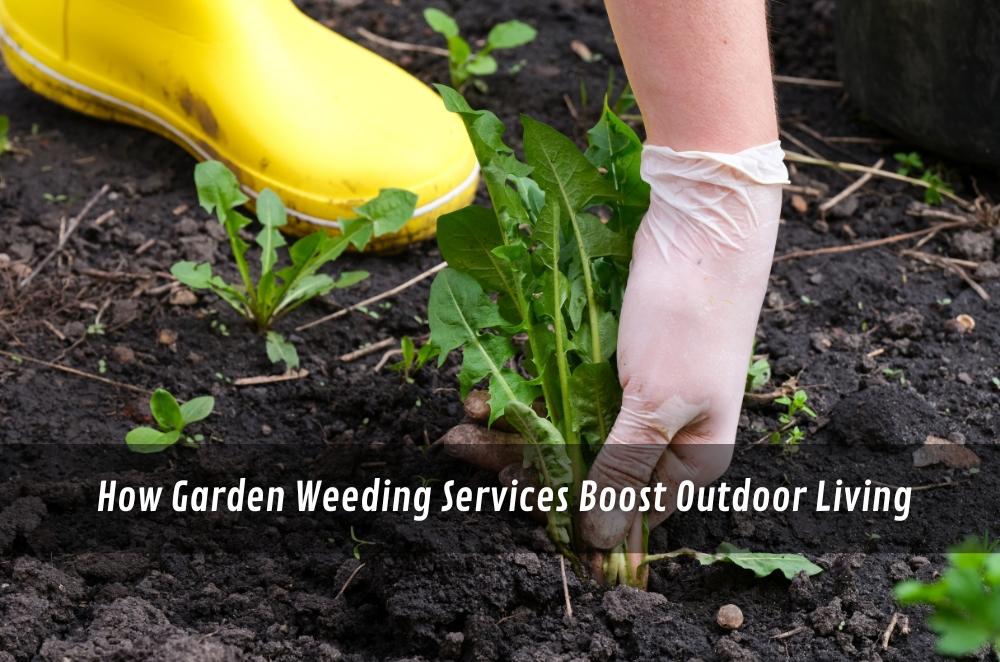How Garden Weeding Services Boost Outdoor Living

Every garden I’ve looked after has followed the same pattern—tidy at the start, then slowly overtaken by weeds. At first, you pull out a few here and there, thinking it’s under control. But within weeks, the veggie patch is buried under invaders, the lawn looks patchy, and the whole space feels like hard work instead of enjoyment. I once let couch grass spread in my yard, telling myself I’d deal with it later. By the time I did, it had smothered half the tomatoes.
That experience taught me that garden weeding services aren’t just about keeping things looking nice. They’re about freeing up your outdoor space so it actually feels usable again. When weeds stop stealing the spotlight, the garden becomes a place for barefoot afternoons, weekend barbecues, and the kind of everyday moments that remind you why you wanted a backyard in the first place.
The hidden costs of ignoring weeds
Weeds seem harmless until you live with them. They do more damage than people think:
-
Pulling water and nutrients away from your plants.
-
Acting as little hotels for pests and fungi.
-
Making lawns unusable (bindii is the classic backyard killer).
-
Multiplying faster than you can yank them out.
One family I worked with in Parramatta had given up on their lawn altogether. The bindii had made it impossible for the kids to play barefoot. After a couple of thorough weeding sessions, the grass came back, and so did the backyard cricket. That’s when you see the real difference—not just the look of the yard but how people use it.
Why professional help makes a difference
Sure, anyone can pull weeds. I’ve done it enough to know. But there’s a reason they come back after you spend a Saturday afternoon pulling them out by hand. The roots stay behind. The seeds are already in the soil. Professionals tackle that part.
-
They can tell the difference between a harmless runner and something invasive.
-
They know how to get rid of weeds properly so they don’t sprout again.
-
They use preventative tricks—mulching, safe sprays, barriers—that keep growth down.
-
And most importantly, they keep a schedule, so the garden never slips too far.
DIY might fix the surface problem. A service gets under the skin of it.
Keeping gardens safe with biosecurity awareness
There’s also the bigger picture. I used to think weeds were just my headache until I read up on how fast pests spread from garden to garden. Turns out, something as simple as moving pot plants around can carry problems across suburbs.
That’s where gardening biosecurity tips become important. The official advice is clear: safe disposal and careful handling matter. It’s not about being overly cautious—it’s about stopping invasive weeds and pests from spreading. Good services already build this into their routine, which means they’re protecting more than just your patch of lawn.
Seasonal approaches that make weeding effective
Weeds don’t punch a clock—they grow whenever they get the chance. Different seasons bring different battles:
-
In summer, fast growers take over bare soil.
-
In autumn, weeds love dropping seeds, ready for the next cycle.
-
In winter, they look quiet but strengthen their roots underground.
-
By spring, it’s chaos again—everything bursts back.
What surprised me over the years is how effective weed removal in winter can be. Even though the garden looks calm, that’s when stubborn roots are digging deeper. Tackling them then means spring growth isn’t choked before it begins. I’ve seen lawns bounce back greener and veggie patches thrive simply because the heavy lifting was done during the colder months, when weeds were least expected to cause trouble.
The link between weeding and wellbeing
One thing that often gets overlooked is how a tidy garden affects how we feel. It’s not just about plants—it’s about mindset. A cluttered, overgrown space has the same effect on your mood as a messy living room. It feels overwhelming.
When weeds are managed properly, outdoor spaces turn into calming environments. Sitting outside becomes easier. Kids spend more time outdoors. Even daily routines, like hanging the washing or having a quiet coffee outside, feel different when you’re surrounded by order instead of chaos.
I once had a neighbour who said that after getting her garden under control, she started using it as her “thinking spot.” She’d never sat outside before, but once the weeds were gone, the garden became her go-to place for unwinding after work.
Beyond weeding: building a lifestyle outdoors
The funny thing is, once weeds are under control, people rediscover their gardens. I’ve seen it countless times.
-
Kids run barefoot on the lawn.
-
Families drag the barbecue back out.
-
Someone plants herbs because the soil looks “alive” again.
-
Neighbours lean over the fence to chat more often.
That’s the part that sticks with me. Weeding doesn’t just clean up a yard. It gives people reasons to use it, to enjoy it. And it’s not about chasing some perfect, magazine-style garden—it’s about making the space livable.
Taking care of the bigger picture
Weeding is important, but it’s only part of the story. A healthy garden also depends on pruning, feeding the soil, mulching, and giving plants the right space to grow. If one piece is missing, weeds find their way back in.
That’s why I often turn to garden maintenance tips when planning longer-term care. It shows how different tasks connect, from simple soil care through to seasonal pruning, and how small, regular effort makes the whole yard easier to manage. When these basics are in place, weeds become less of a constant battle and more of a minor part of the routine.
Final thoughts
Weeds will always try to take over. That’s their nature. But they don’t have to run the show. With a steady hand—sometimes your own, sometimes a professional’s—you can keep them in check and actually enjoy your garden.
I’ve felt it myself: the relief of stepping out barefoot onto grass that isn’t prickly, or sitting with a cuppa surrounded by plants that aren’t being smothered. That’s the real win. Not just neat edges, but the feeling that your outdoor space belongs to you again.





